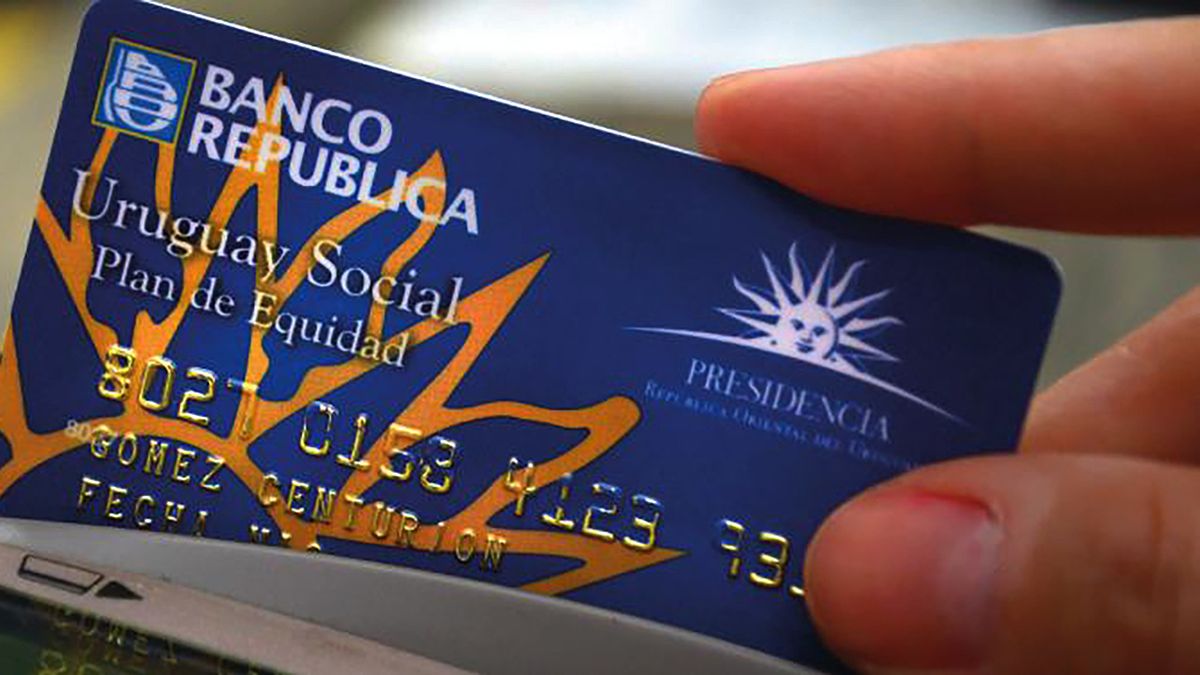The Uruguay Social Card (YOUR) provided by the Ministry of Social Development (you measure) is a means of payment for different benefits of monetary transfers that aims to improve the level of income and access to basic consumption items for people in situations of socioeconomic vulnerability.
The TUS has been in operation since May 2006, under the orbit of the National Directorate of Data Transfers and Analysis (dentity). It is characterized by serving as a means of payment for different benefits of monetary transfers divided into two major modes of operation: socioeconomic vulnerability (1) and specific groups ( 2).
He second group It is made up of some specific population sectors, the condition of extreme socioeconomic vulnerability of its members is assumed a priori given the mere fact of belonging to them. These are:
- trans people.
- Mides shelter users for people living on the streets.
- Women victims of violence and/or human trafficking.
- Persons under one year of age who were born in specific maternity wards (Pereira Rossell Hospital, Hospital de Clínicas, Hospital de Bella Unión, Hospital de Artigas, Hospital de Rivera) whose mother is an ASSE user (State Health Services Administration). (Welcome Baby).
- People with chronic illnesses and in a situation of extreme poverty or indigence (PAEC).
- Pregnant women and/or children from 0 to 3 years of age in a situation of extreme socioeconomic vulnerability (Bonus Parenting).
The transfer is deposited on a magnetic card that can be used in the Solidarity Business Network throughout the country. Purchases made with this device are exempt from VAT.
How to request the Uruguay Social Card (TUS)?
The modalities of admission to TUS differ for the different modalities and benefits.
Due to socioeconomic vulnerability:
Alternative 1, request for visit and visit: People interested in applying for the benefit can contact the central office of Mides or the Territorial Office of the organization to request a visit to your home by a technical team. Subsequently, a team from Mides carries out the visit in order to collect, through the application of a standardized form, the information necessary to assess whether the benefit corresponds. The information collected makes it possible to estimate the value of the index that determines the income of households to the ICC program (or complementary indicators). All households that exceed certain values in the ICC enter the program.
Alternative 2, special quotas: In these cases, the departmental Directorates are in charge of receiving the applications, and it is up to them to assign or not the benefit. In cases where it is understood that the benefit corresponds, the territorial offices initiate an intervention in Smart indicating that it is a special quota, for which it is necessary to attach an authorization note signed by the departmental director. In a period not exceeding 12 monthsthe cases selected in this way must be visited and evaluated from the ICC for the purpose of determining the continuity or interruption of the provision.
Alternative 3, institutional referrals: The institutions/programs that manage housing initiatives (mvotma, ANV, plan together, Mevir, PIAI) notify the TUS management team when they are working with a beneficiary of this modality to protect the expense for ICC improvement for a period of two years after the delivery of the housing solution.
For specific groups:
trans people: They can apply in person at OTs and at the Mides headquarters. The benefit will be assigned For all those people who state, via sworn statement, living with a transgender identity.
Users of Mides shelters for homeless people: The people who will be responsible for collecting the benefit should not apply to access it, will be referred to TUS by the Street team.
Women victims of violence and/or trafficking: The people who will be responsible for collecting the benefit should not apply to access it, will be referred to TUS by the Inmujeres team.
Chronically Ill Care Program: Applications for PAEC are received at the different territorial offices of Mides where the person is asked to present the medical certificate, valid for 3 months, which accounts for the pathology it presents. In the territorial offices, prior to submitting the application, it is verified that the person meets the requirement of belonging to a household that already has TUS for another benefit or if they are a beneficiary of the Old Age Assistance program.
Welcome Baby: The application is made from the identity card of the mother or guardian, based on the daily records of births reported to the Birth certificate (NVC).
Parenting Bonus: The people who will be responsible for collecting the benefit should not apply to access it, will be selected through the information available to the TUS management team.
What are the amounts for each group?
Due to socioeconomic vulnerability:
- Socioeconomic situation of the household: As of 2011 there are two categories of beneficiary households: the 30,000 most vulnerable who receive a double amount, and the next 30,000 who receive a single amount. Based on the ICC, it is determined whether it is appropriate for the household to receive the single or double amount of the transfer.
- Presence or not of minors in the home: The transfer is planned both for households with minors or without minors. In the case of households that do not have minors, they are granted the same amount as a household with a minor.
- Number of minors in the household: The number of minors in the household determines the amount of the transfer. Said amount is capped at 4 minorsthat is, that, from said number of minors, the amount of the transfer does not increase.
1 minor
- simple amount: 1640 pesos.
- doubled amount: 3280 pesos.
2 minors
- simple amount: 2488 pesos.
- doubled amount: 4976 pesos.
3 minors
- simple amount: 3164 pesos.
- doubled amount: 6328 pesos.
4 or more minors
- simple amount: 4410 pesos.
- doubled amount: 8820 pesos.
Amount of Support for Chronic Patients “PAEC”
I mount “Welcome Baby”
In addition, the amount of transfer that the household receives may be increased depending on some elements:
- Age of minors: Households with children from 0 to 3 years of age receive an additional amount for each one of them: 399 pesos.
- Presence of pregnant women: Households with pregnant women present receive an additional amount for each one of them: 399 pesos.
- Distance to solidarity businesses: Households that reside at a distance greater than or equal to 10 kilometers from the nearest solidarity business, obtain an additional fee on their transfer. The extra amount will result from multiplying the value of the rate per kilometer for road passenger transport services on short, medium and long-distance national lines, by the distance in kilometers, round trip to the nearest town where a solidarity trade is located.
For specific groups:
- trans people: receive an amount equivalent to that received by a household in the social vulnerability modality with ICC corresponding to the simple amount with a dependent minor (1640 pesos).
- Users of Mides shelters for homeless people: the amount is equivalent to that received by a household in the social vulnerability modality with ICC corresponding to the simple amount with a dependent minor (1640 pesos) and in the case of users of the Women Program centers with children and adolescents, who have more than one dependent minor, the amount corresponding to said amount is transferred juvenile. On the other hand, there is an exception for users of the centers of the Supported Housing Program (Alzaibar Project, Artigas Institute Project and ANV Project), who by certain ministerial resolutions receive the doubled amount.
- Women victims of violence and/or human trafficking: the amount is equivalent to that received by a household in the socioeconomic vulnerability modality, depending on the number of dependent minors.
- People under one year of age who were born in some specific maternity hospitals (Pereira Rossell Hospital, Hospital de Clínicas, Hospital de Bella Unión, Hospital de Artigas, Hospital de Rivera) whose mother is a user of ASSE (Welcome Baby): the monthly amount for the year 2023 it amounts to 997 pesos, which is multiplied by the number of minor beneficiaries associated with the holder of the benefit.
- People with chronic diseases and in a situation of extreme poverty or indigence (PAEC): the monthly amount for the year 2023 amounts to 997 pesos, which multiplied by the number of beneficiaries associated with the household.
- Pregnant women and/or children from 0 to 3 years of age in a situation of extreme socioeconomic vulnerability (Bono Crianza): the monthly amount of the benefit for the year 2023 amounts to 2,226 pesos, which multiplied by the number of pregnant women and/or children between 0 and 3 years old residing in the household.
What day of the month is charged?
The money deposit will be made monthly according to the last digit of the cardholder’s identity card (not counting the digit that is located after the hyphen). For example, if the document number is 1.234.567-8, it corresponds to collect on the 16th of each month:
Digit 1 – Day 10
Digit 2 – Day 10
Digit 3 – Day 12
Digit 4 – Day 12
Digit 5 - Day 14
Digit 6 – Day 14
Digit 7 – Day 16
Digit 8 – Day 18
Digit 0 – Day 18
Where can the card be used?
In the more than 5,000 shops that make up the Solidarity Business Network throughout the country, duly identified with a sticker. You must always go to the store with the card and the identity card of the holder, since the card is personal and non-transferable.
To check the location of these businesses, you can enter the interactive maps of Mides, select the “Solidarity Businesses” layer and see which business is closest to your location.
What can I buy with the card?
With the TUS it is allowed to purchase products related to the following items: food, personal hygiene, household cleaning, clothing and supergas. There is no minimum amount to make purchases.
Where can I make inquiries and complaints?
calling the 0800 7263Monday to Friday from 9 a.m. to 5 p.m.
Source: Ambito




